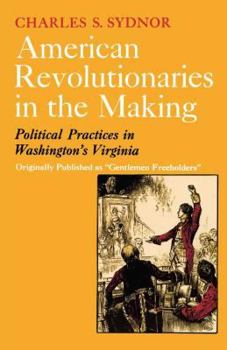American Revolutionaries in the Making: Political Practices in Washington's Virginia
Select Format
Select Condition 
Book Overview
From Simon & Schuster, and originally published as Gentlemen Freeholders, American Revolutionaries in the Making is Charles S. Sydnor's exploration of the political practices in Washington's Virginia. A masterclass in political ideology and a expansive history of the early American colonization, Charles S. Sydnor's American Revolutionaries in the Making tracks the many political strategies and practices in the era...
Format:Paperback
Language:English
ISBN:0029323908
ISBN13:9780029323908
Release Date:May 1965
Publisher:Free Press
Length:160 Pages
Weight:0.55 lbs.
Dimensions:0.5" x 5.3" x 8.3"
Customer Reviews
2 ratings
Politics in 18th century colonies
Published by Thriftbooks.com User , 16 years ago
I picked up this book thinking I was to be treated to juicy details about how our founding fathers started on the road to the revolution. After reading the book, I understand the title better, but was disappointed with the content as I did not get what I was expecting. The book explains how campaigning in the 18th century was vastly different than today. Examples include the actions of the candidate, who didn't shake hands and give speeches but relied on their friends to `talk them up'. Candidates were present on election day, since there was only one voting site per county. Newly elected officials were groomed by the veterans to prepare them as they ascended the political ladder. Sydnor also centers on several well known Virginians such as Washington, Madison, Mason, Jefferson, and Wythe as examples of their trek through the political gambit. Despite not fulfilling my expectations, I was introduced to a deeper level of government before we created our own. This book is a good resource for teaching students about the fledgling democracy as experienced by her founders. I would refrain from assigning it to the students to read directly, as it read like a graduate thesis.
Training America's Early Leaders
Published by Thriftbooks.com User , 19 years ago
In American Revolutionaries in the Making, Professor Charles S. Sydnor examines the political structures and processes in Virginia prior to the American Revolution. His goal is to understand how those structures and processes brought forth the large number of highly capable leaders who were key to the formation and leadership of the United States in the revolution and early days of independence: George Washington, Thomas Jefferson, James Madison, James Monroe, Patrick Henry, George Mason, and John Marshall, to name only the most prominent. Professor Sydnor describes three steps along the pathway to power in colonial and revolutionary Virginia that brought these men to the top: 1. Justice of the Peace: The first public office held by almost all of these men was Justice of the Peace in their home county. This office was quite different from anything in the current age. Each county had from 10 to 30 Justices, who collectively formed the County Court. This court not only heard cases of civil and criminal law but also constituted the primary governing body of the county with executive and legislative as well as judicial powers. Justices were commissioned by the Governor, usually based on nominations from the current members of the Court. The Court was, therefore, a self perpetuating body not directly subject to popular control. The only avenues of recourse open to the public were petition to the Governor or the House of Burgesses, colonial Virginia's elective legislature, to which each county elected two members. The County Courts typically chose their nominees for Justice of the Peace based on talent and promise from aspiring members of the land-owning gentry. Selection was not based on popular opinion, campaign promises, or oratorical skills. Once commissioned, a new Justice embarked on a practical education in all aspects of county government and relations with Governor and House of Burgesses under the guidance of the senior justices. 2. Election to the House of Burgesses: A county's members of the House of Burgesses were the only elected officials of any significance in colonial Virginia. The Governor was appointed by the King (prior to 1776) or by the House of Burgesses (after 1776). The election of Burgesses was democratic, based on the limited franchise of the day: White males who owned a requisite number of acres of land in a county could vote in that county. This qualification led to several results that seem strange today. A man was qualified to vote in every county in which he owned sufficient acreage. However, to exercise his multiple votes, he had to physically present himself at the county seat of each county on election day; the physical demands placed a practical limit on multiple votes. A voter could also seek election in any county in which he could vote, regardless of his residence. George Washington was elected to the House from Frederick County, 50 miles west of his home in Fairfax County. The restriction of the vote to the la





